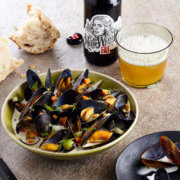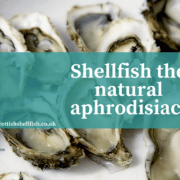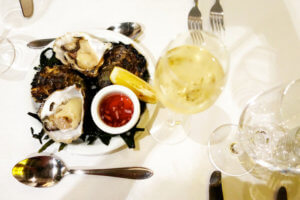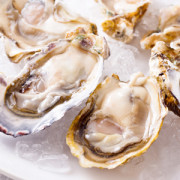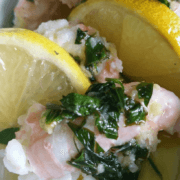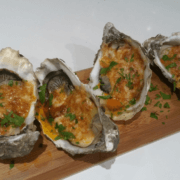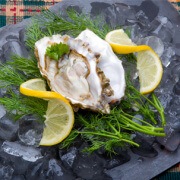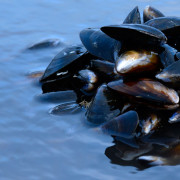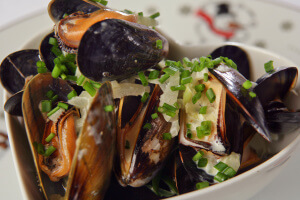Tag Archive for: Scottish Shellfish
Mother's Day is this Sunday (11th March 2018)! We hope you have got your card and flowers sorted to thank your Mum for all she has done for you. Why not offer to cook her dinner? We have pulled together 2 menu's that you could cook the special lady who raised you.
Menu 1
Starter - Tipsy Prosecco Mussels
Main - Lobster Risotto
Dessert - Mixed Fruit Tart
Menu 2
Starter - Langoustines with a Roast Garlic & Lemon Butter
Main - Gin & Tonic Mussels
Dessert - Lemon Sorbet
Gifts
Have you got her a gift yet? You know that Mum's always love homemade gifts right? Why not give one of these a go? Make your Mum smile knowing you have spent some time and effort on her gift.
Share with Us
We would love to see the pictures of your Scottish shellfish inspired Sunday lunch for your Mum and any of the above gifts you have made from shellfish shells, there might even be a gift in it for you.
Casanova’s breakfast choice
Valentine’s Day is upon us! Now is the time to plan a special meal that will tantalise your loved one. Oysters the well-known aphrodisiac, purportedly increasing the libido of all who eat them. In fact, Casanova is said to have started his day with 50 of these delicious bivalves! But did you know that plenty of other shellfish have the same sexy quality?
Shellfish the natural aphrodisiac!
A true aphrodisiac, increases sexual potency in men and desire in women. With some cultures claiming that they also contribute to improved fertility. While all claims to unparalleled desire must be taken with a small pinch of salt, there is indeed truth to the idea that oysters and other shellfish are good for a boost.
Power of Zinc
Help comes in the form of zinc, in which oysters, mussels, and other molluscs are particularly high. Low levels of zinc can contribute to diminished libido, as can low levels of testosterone. Zinc triggers the release of testosterone in each sex, which will give both men and women that burst of energy they are looking for on February 14th!
Spoil your other half
Even without the chemical evidence, there’s something to be said for preparing a tasty meal and surprising your partner. Delicate flavours from the best sources in the world, can’t fail to earn you brownie points. Cooking a treat of a meal for your lover is better than serving up all the outlandish aphrodisiacs in the world.
Valentine recipes
Half a dozen oysters, freshly shucked and served with a squeeze of lemon, or a dash of Tabasco if you like it hot; lobster with lashings of butter; a bottle of crisp white wine, all taken by candlelight and soft music playing in the background. Now that sounds like the ideal way to show your other half just how much they mean to you, and any nutritional benefits are just a happy plus-point.
Working class food
It seems odd to modern foodies that Scottish oysters were once a mainstay of the working classes. A luxury item around the world in the 21st century, they were cheap and plentiful up until the beginning of the 19th. Roman soldiers consumed them while building the Antonine Wall in the second century, and Edinburgh was once famous for its oyster cellars.
Oyster pie!
Eaten in steak and oyster pie, or in pubs to soak up the ale, it was not unusual to enjoy oysters by the handful. Oysters and Guinness were a famous pairing across the water, but Scots tended to match them to almost anything.
Street snack
Many cities boasted barrels of oysters on ice, a street snack that it is difficult to imagine today. There is an old rule about only eating oysters during months with ‘r’ in the name, and this is partly due to the weather and likelihood that the oyster had spoiled during those hot summer days out in the sun. There was also a need to allow oyster beds to respawn during this time. Needless to say, there is no need to abstain today.
Scottish quality and taste
Oysters are one of the types of shellfish that take on the flavour of their environment, and we are lucky that in Scotland our waters are clear and cool, making our oysters juicy and delicious. They are cultivated in mesh bags on metal trestles on the sea floor, and it can take up to three years for an oyster to reach its full potential. With some species, it may take as long as eight years! This may seem like a lot of work, but it does mean that oysters are of an excellent, consistent quality. Scottish oysters are an affordable luxury, ideal for a special meal at home. Additions of Tabasco, shallot vinaigrette, or simple lemon should not be skipped, as they make the oysters sing.
References
Cultural Delight
Mussels are a cultural delight: a dish that you are as likely to find in a fine dining restaurant as in the local pub, and quick and easy to whip up at home. Scottish mussels are some of the best in the world. Prepared with other local ingredients, they make a meal to remember.
Rope Grown
Our mussels are rope-grown on the West Coast of Scotland and in the Shetland Isles, but that wasn’t always the case. They have been a part of our diet for more than 20,000 years, and while cultivation started in the thirteenth century, there was plenty of hard work that went into harvesting them prior to that.
Collecting Mussels by Hand!
It was not uncommon to spend hours collecting mussels by hand from their natural environment, walking along the sea shore with a bucket and perhaps a knife to gently ease the shell away from the rock. The mussels may then have been placed into saltwater to continue to fatten up and filter out some of the grittiness before being cooked up.
Mussel Stew
A traditional Scottish recipe for mussel stew included staples that we see in other mussel-loving cultures around the world: garlic, parsley and cream. These days we are more likely to opt for moules marinière. Tarragon is a novel replacement herb, giving the dish a warming sensation perfect for those chilly Scottish evenings.
Natural Bed vs Cultivated
Mussels collected from natural beds often have a gritty texture, and may not be as plump as cultivated ones. Farming allows for fat, juicy specimens that soak up the seasoning as they cook, and never offending with a sandy mouth-feel.
Eco-friendly
The methods that we use on our small isle mean that mussels are ecologically sound, too. In Europe and much of the rest of the world, mussels are harvested through dredging, harming starfish and other creatures. With rope grown cultivation, Scotland’s mussels do only good.
References
Scared of shellfish?
Despite being a previous Food Blogger, and what I would consider to be open minded around trying new or unusual food, I'm a big fearty when it comes to shellfish.
I like regular fish. Fish with flesh. Simple, unassuming fish that doesn't look at you when served with eyes full of sadness. Fish such as filleted salmon, cod, sea bass, haddock (you get the picture). I often order fish when eating out as I rarely know what to 'do' with it to make it appetising at home.
Shellfish based challenge
So, when I agreed to embark on a shellfish based challenge presented by Scottish Shellfish, I really was treading water. They kindly sent me langoustines, oysters and mussels to experiment with (three fish I would normally avoid at home). I have to say I am impressed at how fast and simple they were to work some magic on and what natural flavour they held within themselves, you really don’t need to tamper all too much!
Cooking the langoustines
I knew langoustines didn't take long to cook, nor should they be masked by any heavy flavours or sauce but other than that I was a tad stumped. My innate reaction was to pair them with lemon and parsley, so I went with my gut and did just that (along with a clove of roasted garlic as this gave a sweet hum to the butter). After reading a couple of articles I soon established they would be cooked in around 10 minutes (fast food indeed!) and after consulting a few videos on YouTube I was confident on how to get the blighters open.
Although I did have to 'coach' myself when cooking and handling these sea-based creepy crawlies they were very much worth it and encourage everyone to give them a go!
Try some shellfish!
Sadly, many of our fish caught in Scottish waters travels overseas to be enjoyed. This is down to people like me who are afraid to branch out, don't know what to do with it or have simply never tried it before! With variety in abundance, short cooking times and many health benefits associated with lean mass and essential oils, shellfish is a great alternative for a week day main meal or a special weekend dinner date.
I urge you to try this recipe if you haven't before, or dabble in some other varieties of seafood should you be a regular visitor to your fishmonger already!
Method
- To enjoy fresh langoustines in minutes simply place them into boiling water, cover with a lid and cook for 8 minutes.
- Whilst they are in the pot, melt butter in a separate pan, add coarsely chopped parsley, a clove of crushed pre-roasted garlic, lemon juice, salt and pepper to taste.
- To remove the meat from the cooked langoustines, remove the head, squeeze the sharp sides together until you hear a crack (all the way along) and finally prise apart the shell to remove a relaxed 'C shape' of succulent meat.
- This meat can then be dipped in the butter or drizzled over, either way they make a fantastic fast food starter or fancy appetiser!
This recipe and blog was written by Nicola Reid (former Food Blogger), you can reach her on Twitter.
Sacrilege?
Long-time advocates of Seafood will think of this next experiment (grilled oysters) as sacrilege but as I believe many people, like me, struggle with the notion of ‘shooting back’ raw oysters. I wanted to try another method of preparation so at least I could try them.
On the Beach
From this trial in my kitchen I couldn’t get over the amazing smell from the grill as I cooked these, if I closed my eyes I could swear I was standing beside a smoky barbeque on the beach – not sheltered inside from the rain!
Top Tip
Practice is required when shucking (opening) oysters and you can’t be too careful. Despite watching several YouTube videos I still managed to cut my hand – not my finest moment! I recommend using a thick or folded towel to protect the hand holding the oyster and to give more grip. Also use the flat edge of a small knife, not the cutting edge.
Method
- Place your shucked oysters on a baking sheet or grill pan and be careful not to lose too much of their internal water and ‘juice’ in the process;
- In a dish, prepare a cheese, mayo and smoked paprika mix. I used a mix of cheddar and mozzarella but you could use any melting cheese including parmesan. The paprika gives good flavour, colour and smell with the mayo used to lightly bind them all.
- Place a teaspoon of mixture on top of each oyster and grill on a medium-high heat for 2-3 minutes until golden and bubbling.
Some people say it’s easier to shuck oysters once they have been on the grill for a while and boiled up inside. You may want to try that first, but warning, these shells get HOT even after a minute or so under the grill.
This recipe was developed by Foodie Nicola (Nikki) Reid, you can get her on Twitter here. If you would like your recipe featured on our website get in touch.
In recent years there have been many TV adverts and health promotions highlighting how important Omega 3 fatty acids are for our health. How they are particularly good for your brain, but what are the other benefits?
Fatty Acids
Omega 3 is also known as ‘fatty acids’, but don’t be fooled by the description, we need healthy fats in our diets to keep our brains working. Omega-3’s also serve to cut cholesterol, which is fantastic news for your heart. It is suggested that even one portion of shellfish per week can reduce the chances of a heart attack by 10%!
Benefits
The benefits of Omega-3 fatty acids extend to almost every area of health. Pregnant women may want to give their babies a boost by including them in their diet. This will improve vision and even intelligence in the babies while they are still in the womb. Adults will gain benefits too, because including Omega-3 fatty acids in their diet has been shown to help with memory loss and even depression.
Shellfish & Omega 3
Shellfish are high in Omega 3’s which means a healthy heart, a healthy brain, and healthy bones. All from just one to two delicious shellfish additions to your weekly meal routine.
What’s not to love about shellfish? Find out if all shellfish are good for you here.
Mussels are an under-appreciated wonder food. Full of vitamins and minerals, high in protein and low in fat. It is a wonder these culinary stars are not more of a staple in the British diet. However, with more information about the health benefits of mussels than ever before, it’s starting to change. Top nutritionists and fitness professionals have started to explore how the simple mussel boosts physical health.
Health Benefit 1 - High Protein and Low Fat
Seafood (shellfish in particular) is high in protein and low in fat. This is great news for anyone on a calorie restricted diet, as it shows it’s possible to enjoy exciting meals that are healthy without sacrificing flavour. There is no need for fat, as steaming or boiling with a few herbs or white wine is the best way to prepare a tasty mussel dish.
Health Benefit 2 - Iron & Protein
For those who enjoy a high-protein intake, mussels offer a welcome break from steak. Not only are they better for the environment (as they are ecologically friendly and easy to farm) they also offer levels of protein and iron that rival that of red meat. An increase in protein and iron intake boosts mood, energy levels, and even complexion. A fantastic outcome from introducing mussels to your weekly diet!
Health Benefit 3 - High in Vitamins A & B12
Vitamin A is excellent for the skin, eyes and immune system. While B12 is an essential vitamin that only naturally occurs in animal products. B12 deficiency can lead to problems with heart health and anaemia, among other complications, and is important for overall health. Make sure you get the recommended daily allowance from dairy products, eggs, and, of course, sources such as shellfish and mussels.
Health Benefit 4 - Improves Brain Function
Mussels contribute to circulatory health and energy levels. Are brilliant for improving brain function and reducing inflammatory conditions, such as arthritis.
Health Benefit 5 - Omega-3 Fatty Acids
The heart benefits from a reduction in the risk of heart attack due to those all-important Omega-3 fatty acids. Omega-3s are vital, and have all sorts of health benefits that should not be overlooked.
Why Mussels?
Mussels are one of the most well-rounded foods to include in your diet, high in zinc, iron and other minerals, vitamins A and B12. A fantastic source of protein, low in calories and low in fat. Prepared in a classic moules marinière or in a more adventurous Thai curry, or simply steamed. No matter how they are eaten, rest assured they are a delicious and healthy choice.
Scottish Shellfish

Latest from the blog
- ASC Accreditation for Scottish Farmed OystersApril 18, 2024 - 5:34 pm


